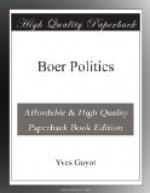But Articles 7 and 14 guarantee to all white men, civil rights, the protection of their persons and property, the right to enter into trade, and equality of taxation. How did the Boers construe the application of these conditions of the Convention of 1884? As early as 1885 Mr. Gladstone found himself obliged to send Sir Charles Warren to prevent the Boers from invading Bechuanaland. Mr. Krueger had already attacked Mafeking, and annexed the territory. The Boers retreated, but brutally murdered a man named Bethell who had been wounded by them.
That same year, the case of Mr. James Donaldson came before the House of Commons. He held property in Lydenburg. He had been ordered by two Boers (one of whom was in the habit of boasting that he had shot an unarmed Englishman since the beginning of the war, and had fired on several others) to abstain from collecting hut taxes on his own farm. On his refusal he was attacked by them; three other Boers joined them, and he was left in such a condition that he was thought to be dead.
Upon the representations of the English Government the aggressors were condemned to pay a fine; but the Government of Pretoria remitted it!
An Indian, a British subject and man of education far superior to that of the greater part of the Boers, while following a bridle path trespassed on the farm property of a member of the Volksraad, named Meyer. He was arrested, and accused of intent to steal. Sent before the owner’s brother, who was a “field cornet” (district judge), he was condemned, with each of the Hottentot servants accompanying him, to receive twenty-five lashes, and to pay a fine. Rachmann protested, declared that the field cornet was exceeding his authority, intimated an appeal, and offered bail of L40; notwithstanding, he received the twenty-five lashes. George Meyer, the field cornet, knew perfectly well that he was exceeding his authority, but thought it too good a joke to desist. The Court, presided over by Mr. Jorissen, condemned him to pay damages to Rachmann. This was reimbursed to Meyer by the Government, and, despite the judgment of the Court, the President said he was in the right, and that he would protect him.
This is the way in which Mr. Krueger understands justice towards Europeans and European subjects; let us see how he understands it with regard to natives.
A Kaffir, named April, having worked several years on a farm, asked for his salary as agreed in cattle and a pass. The farmer refused him the cattle, and wanted to force him, his wives, and children, to continue working for him. The Kaffir appealed to the field cornet Prinsloo, who treated him as an unruly slave. The Court condemned Prinsloo for abuse of power. Some days later the President announced that he had reimbursed Prinsloo his expenses and damages, remarking: “Notwithstanding the judgment of the Court, we consider Prinsloo to have been in the right.”
[Footnote 9: Le Siecle 29th March, 1900.]




